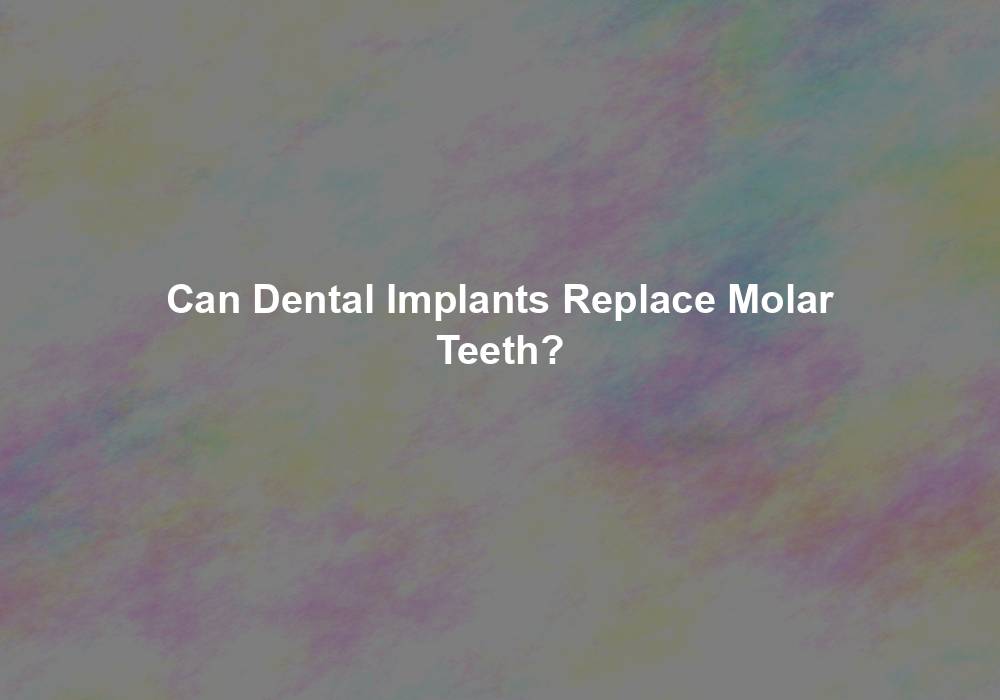Dental implants have revolutionized the way we approach oral healthcare, especially in the realm of tooth replacement. This is particularly true for molar teeth, which play a critical role in our oral health and overall quality of life.
The loss of a molar tooth, often due to decay or periodontal disease, can significantly impact a person’s ability to chew and speak comfortably. This article delves into the feasibility and effectiveness of dental implants as a solution for replacing molar teeth, offering a beacon of hope for those struggling with tooth loss.
Understanding Molar Teeth
Molars are the workhorses of our mouths. Located at the back of the oral cavity, they are responsible for grinding food, aiding in digestion, and maintaining the structure of the jaw and face. Loss of these vital teeth can lead to a cascade of problems, including difficulty in chewing, speech issues, and even a loss of self-esteem. Common reasons for molar loss include tooth decay, trauma, and periodontal disease, each leading to a gap that needs filling to maintain oral harmony.
What are Dental Implants?
A dental implant is a titanium post that’s surgically inserted into the jawbone, replacing the root of the missing tooth. Atop this post, an abutment is placed, which holds a custom-made crown that resembles and functions like a natural tooth.
This process not only restores the aesthetic appearance but also the functionality of a real tooth. The benefits of dental implants are manifold – they are durable, prevent bone loss, and do not affect adjacent teeth, unlike bridges or dentures. However, they are not devoid of risks, which include infection, nerve damage, and implant failure.
Dental Implants for Molar Replacement
Replacing a molar with a dental implant poses unique challenges. The back of the mouth often has less bone density, making implant stability a concern. Moreover, the location of molars demands precision in implant placement to avoid nerve damage. Despite these challenges, dental implants have shown high success rates in molar replacement. For instance, a 2018 study in the Journal of Oral Implantology reported a success rate of over 95% in molar implants over a five-year period.
Comparing Alternatives to Dental Implants
While dental implants are a popular choice, alternatives like bridges and partial dentures exist. Bridges require altering adjacent teeth, potentially leading to long-term issues, whereas dentures might lack stability. However, these options can be more cost-effective and less invasive. The choice often depends on individual circumstances, such as oral health, financial considerations, and personal preferences.
Read: Are You a Good Candidate for Dental Implants?
Post-Operative Care and Maintenance
After implant surgery, it’s crucial to maintain good oral hygiene to ensure the longevity of the implant. This includes regular brushing, flossing, and dental check-ups. Long-term care is relatively straightforward, requiring the same attention as natural teeth. However, neglect can lead to peri-implantitis, a condition similar to gum disease, which can jeopardize the implant.
Cost and Accessibility of Dental Implants for Molars
The cost of molar dental implants can vary widely, influenced by factors like geographical location, the complexity of the procedure, and the materials used. While insurance coverage for dental implants is growing, many patients still face significant out-of-pocket expenses. Fortunately, many dental offices offer financing plans to make this option more accessible.
Read: What Happens When a Dental Crown Breaks?
Conclusion
Dental implants stand as a beacon of hope for those suffering from molar tooth loss. They offer a durable, functional, and aesthetically pleasing solution that, when cared for properly, can last a lifetime. As technology advances and accessibility improves, dental implants are becoming an increasingly viable option for more people. It’s essential for anyone considering this option to consult with dental professionals to make an informed decision that aligns with their health needs and financial circumstances. The journey to a restored smile and improved quality of life is within reach, thanks to the wonders of modern dental implantology.
Frequently Asked Questions (FAQs) on Dental Implants for Molar Teeth
- Can anyone get dental implants for molars?
- Dental implants are suitable for most adults with missing molars. However, certain conditions, like inadequate bone density, uncontrolled diabetes, or heavy smoking, may affect eligibility. A detailed assessment by a dental professional is necessary to determine if you are a good candidate for molar implants.
- How long do dental implants for molars last?
- With proper care and maintenance, dental implants can last a lifetime. The crown attached to the implant may need replacement every 10-15 years, depending on wear and tear. However, the longevity of the implant also depends on factors like oral hygiene, lifestyle choices, and overall health.
- Are dental implants for molars painful?
- The procedure for placing dental implants is usually performed under local anesthesia, minimizing discomfort during the surgery. Post-operative pain is typically mild and can be managed with over-the-counter pain relief. Most patients report less discomfort than anticipated.
- How long is the recovery time after getting a molar implant?
- The initial healing phase, where the implant integrates with the jawbone, can take 6-12 weeks. However, the total recovery time varies, depending on individual healing processes and whether additional procedures (like bone grafting) are required. Your dentist will provide a more accurate timeline based on your specific case.
- How much do molar dental implants cost, and are they covered by insurance?
- The cost of molar dental implants varies widely, depending on location, complexity, and the materials used. While dental insurance coverage for implants is increasing, many plans still offer limited coverage. It’s advisable to check with your insurance provider and discuss payment plans with your dental office for a clearer understanding of the costs involved.
